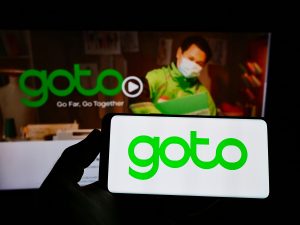Indonesia’s top tech company, GoTo, debuted on the Indonesia Stock Exchange earlier this month. The move has been anticipated since ride-hailing mega-app Gojek merged with e-commerce platform Tokopedia to create the largest tech company in Indonesia. GoTo touches virtually every part of Indonesia’s massive and growing e-commerce sector, so it’s been a closely watched IPO. Other big tech stocks in the region, like Grab and Sea, have seen their stock prices come under pressure in recent months, with Grab in particular having a disappointing debut on the Nasdaq last year.
Despite such headwinds, GoTo lowered its valuation and pushed ahead with the public offering. The shares were listed at 338 Indonesian rupiah a piece, and ended the first day of trading above the list price at 382. While a week is too short a time to tell us much, the stock has so far held its value. As reported by Reuters, GoTo netted $1.1 billion and a valuation of $31.6 billion, making it one of Indonesia’s most valuable listed companies along with blue chips like Bank Central Asia and Telkom Indonesia.
In its way this is quite remarkable, since those companies are profitable and GoTo is not. Like its peers, Sea and Grab, GoTo has been a loss-making business for years. Audited financial statements included in the investor prospectus show that GoTo’s pre-tax loss in 2020 was 16.7 trillion rupiah (approximately $1.2 billion), which was actually an improvement over its 2019 loss of 24.2 trillion rupiah.
This is not unexpected with consumer-facing tech start-ups. Such companies are often loss-makers in the early stages, burning through cash raised from deep-pocketed investors as they expand market share, plowing money into research, development, and marketing. According to the prospectus, from 2018 to July 2021 GoTo spent 8.3 trillion rupiah (approximately $579 million) on research and development alone. Given the company’s dominant position in Indonesia, including in online retail, deliveries, ride-hailing, and finance, in five to ten years (if the region’s e-commerce market grows as projected), GoTo will be much more valuable than its current earnings suggest.
But there’s more to this listing than just balance sheet analytics. GoTo is a key part of Indonesia’s vision for future economic growth: It’s a company that uses technology and capital to make domestic markets more efficient, in the process attracting large capital inflows, a major priority of the Jokowi administration. The company’s model is not perfect, but in general Gojek drivers earn above minimum wage in most cities, restaurants and shops using the app see increased sales, and platforms like Tokopedia allow small businesses to take their products directly to market. This is the type of company Indonesian policymakers envision driving economic growth for the long-term.
The way GoTo has proceeded with its IPO reflects some of these larger political economic and strategic considerations. In contrast to Grab, which seized on the hot stock market last year to go public in the U.S. via a speculative financial vehicle called a SPAC, GoTo has proceeded more methodically and cautiously. As investor sentiment cooled in recent months, GoTo revised the valuation down and pushed ahead, confident that demand for its shares would be there.
In part this is because the offering was squarely aimed at local investors with a secondary purpose of helping to bolster and develop Indonesia’s domestic capital markets. The local stock exchange has grown quite rapidly in recent years and policymakers are keen to build on that. From 2012 to 2021, the Indonesia Stock Exchange added 307 listed companies and the market valuation of all listed companies more than doubled.
GoTo’s IPO will, among other things, help to consolidate this momentum while signaling that the Indonesia Stock Exchange is a place where capital can be safely and profitably invested in cutting edge companies that are skill and technology-intensive. It’s an important shift because historically the Indonesian economy has been associated with labor-intensive manufacturing and foreign investment in extractive industries. We don’t know how all of this will play out over the next five or ten years, but GoTo’s IPO is not just about profit-maximization or value investing; it reflects some bigger shifts that are underway in terms of how Indonesia’s economy is perceived and structured.

































